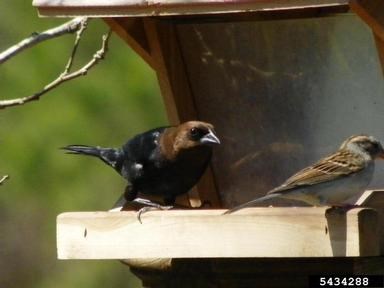
Karan A Rawlins, University of Georgia, bugwood.org Although the Brown-headed Cowbird is native to the area, it is considered a nuisance species. It is a common bird with a wide range. The Cowbird gets its name from its habit of following cattle (horses, bison and other grazing animals, too) and eating the seeds they stir up from the ground. Cowbirds are not only advantageous eaters, they also take advantage of other birds' nests as brood parasites. Cowbirds lay their eggs in the nests of other birds- generally birds similar to their size, but they have been found in hummingbird and raptor nests, too. The female cowbird can lay up to 40 eggs per year, leaving them to be cared for by the host bird. When the eggs hatch, the host bird feeds the young cowbirds, neglecting their own young. Only about 3 percent of cowbird eggs hatch and reach maturity. When host birds recognize the foreign eggs in their nests, they react in several different ways. Some, like Georgia's state bird, the Brown Thrasher, physically remove the eggs from their nests. Others abandon their nests entirely or bury the unwanted eggs under nest materials. If the eggs do hatch, some of the cowbird young may die because they do not receive the proper nutrients- those hatched in House Finch nests are fed a vegetarian diet, which does not sustain them. |
Last updated: April 14, 2015
